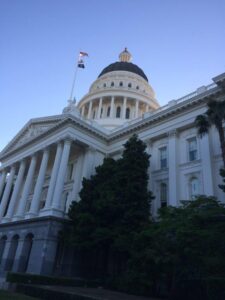Online Sales Tax Draft Circulates in House

We've got more Internet sales tax news! You may recall that the Marketplace Fairness Act, which would allow states to collect sales tax from purchases made online, passed in the Senate in 2013 but never made it to the House floor. At the end of the 2014 session, House Speaker John Boehner voiced, "significant concerns about the bill," and tabled it indefinitely.
Although it sounds like the Marketplace Fairness Act is dead, the topic of Internet sales tax is far from over. House Judiciary Chairman Bob Goodlatte circulated a discussion draft about online sales tax that is meant to be a way to re-start the conversation.Read more
“Blogging with Friends”
 As a multistate tax consulting firm, we often partner with CPA firms, other service providers and technical content providers to provide the best service to our clients and to share information. For several years, we have been affiliated with Sales Tax Support. Sales Tax Support provides information and blogs concerning sales and use tax. The website offers free information to help businesses trying to answer their own unique questions regarding sales tax. There are a number of featured contributors from a variety of backgrounds all committed to answering questions about sales tax. The issues may pertain to a specific state, issue, or industry. Sales Tax Support sorts the information in a fashion that is very easy to navigate, so finding the first steps or solution to your sales tax questions can be made possible here.
As a multistate tax consulting firm, we often partner with CPA firms, other service providers and technical content providers to provide the best service to our clients and to share information. For several years, we have been affiliated with Sales Tax Support. Sales Tax Support provides information and blogs concerning sales and use tax. The website offers free information to help businesses trying to answer their own unique questions regarding sales tax. There are a number of featured contributors from a variety of backgrounds all committed to answering questions about sales tax. The issues may pertain to a specific state, issue, or industry. Sales Tax Support sorts the information in a fashion that is very easy to navigate, so finding the first steps or solution to your sales tax questions can be made possible here.
State Taxes News: Sales & Use Tax Compliance Crackdown

Depending on where your business is located, you may receive a visit from a representative from the Board of Equalization, California's tax regulator. As this article explains, the organization recently rolled out the Statewide Compliance and Outreach Program (SCOP) to find businesses that are skirting state taxes and licensing and, "Bring them into compliance." However, despite it being originally pitched as an educational program to help answer business owners’ questions and help them comply with use, sales tax and licensing laws, the SCOP has turned into intimidating in-person visits that trigger audits on state taxes.
With more than 5,000 taxing jurisdictions in the country, complete compliance is very difficult – especially as companies expand their operations into multiple cities, counties and states. As this video explains, every company’s situation is different because state taxes are driven by various facts and circumstances beyond business location; many are dependent on the company’s industry, eligible credits and incentives and more. It’s no wonder many business owners are confused!Read more
Focus on Arizona

Last month the Arizona Commerce Authority (“ACA”) hosted an event to watch the San Francisco 49ers take on the Arizona Cardinals at the new Levi’s Stadium in Santa Clara. Gilbert Gonzalez, Vice President of Business Attraction Northern California, of the ACA invited us to attend. While we had a great time at the game, we also got to learn more about what the ACA offers to businesses expanding or relocating into Arizona. The state offers various appealing tax credits and incentives (some very similar to what California offers, watch out Golden State!) as well as a great business climate that may just steal a few California businesses.
As our way of saying thanks, we decided to put our focus on the Grand Canyon State for this feature of the State of the Month.
Business Climate
The manufacturing industry in Arizona plays a pivotal role in serving other industries. The state has over 4,500 establishments and employs over 155,000 people in manufacturing. The average wage of a manufacturing position is 50% more than the average wage for any position in Arizona. In 2012, the total manufacturing output was $23.66 billion, equivalent to more than 10% of Arizona’s Real GDP.
Another key sector in Arizona’s economy is the aerospace & defense industry. This industry has over 1,200 companies including major contractors such as Raytheon Missile Systems (11,900 employees) and Honeywell Aerospace (10,100 employees). This sector represents over 150,000 jobs and contributes $15 billion to the gross state product.Read more
An Introduction to Bitcoin & State Tax Issues

If you’ve been paying attention over the last few years, you’ve surely heard of Bitcoin, a virtual currency becoming more and more common – especially in California. But since Bitcoin is virtual and unregulated (at least at this point), there are a lot of questions surrounding the digital currency and how it relates to state tax issues.
What is bitcoin? Bitcoin is a virtual currency created in 2009. Transactions are made directly between two parties, without banks or other fees included. They can also be used anonymously, making it possible for users to buy or sell anything without it being easily traced back to them. Because bitcoins are stored in a "digital wallet" either in the cloud or on a computer, the FDIC doesn’t insure them, meaning they can be easily lost through server hacks and viruses.
What about regulation? As bitcoin has become more popular, the question of regulation has become more common. Two states – California and Colorado – are working to regulate this virtual currency due to its prevalence within their states. I would imagine more states will follow suit as bitcoin becomes more and more popular.Read more
2014 – The Year in Review

Thank you to all of our regular readers! The blog was an exciting addition to our firm this year and we’ve enjoyed bringing you current and thought provoking articles and summaries related to multistate topics.
We covered a lot this year, including:
- State of the Month – Every month we featured a different state of the union, covering its economic climate, tax scheme, and relevant tax credits and incentives available, along with some fun facts. Some of the recent states that we covered include Florida, Colorado, and Ohio.
- California Credits and Incentives Landscape – During 2014, California rolled out three new tax credits and incentives under the GO-Biz program (to replace the repealed EZ program), as well as enhancing the film tax credit. We reported on all of those here, including the California Manufacturers’ Exemption, Hiring Credit, and California Competes.
- Federal & Multistate Updates – The Marketplace Fairness Act was in the news a lot during 2014, although it was ultimately tabled by House Speaker John Boehner. Here are a few of the blogs in which we introduced the act, highlighted the updates, and provided our take on it.
- When we’re not blogging about multistate tax issues or tax credits and incentives we have also written about fundraising tips, charitable giving, and even fun topics such as calculating the amount of sales tax Santa Claus would hypothetically collect.
We hope you’ll continue to follow Miles Consulting Group in 2015 as we bring you the latest in multistate tax news.
In the meantime, we wish you and yours a very happy new year. See you in 2015!
Photo Credit: maaco via Flickr
Charitable Giving & Year-End Tax Tips

Can you believe 2014 is almost over? In addition to the hustle and bustle of the holidays, this is the time of year minds turn to year-end tax tips. Philanthropy and giving back to the community all year is important to Miles Consulting, which is why we encourage charitable giving activities. However, whether you’re donating as a business or individual, it’s important to remember recent changes to tax law.
4 Year-End Tax Tips for Charitable Giving
1. Double check eligibility. You’ll only receive a deduction for organizations that are qualified, so make sure you use the IRS’ Select Check to verify their status. It’s also worth noting that, even if they aren’t listed in Select Check’s database, government agencies, churches, temples, synagogues and mosques are qualified to receive deductible donations.Read more
Focus on Florida
 Winter is the coldest season of the year and we folks in the Northern Hemisphere are currently in the midst of it. Although every state in the nation experiences lower temperatures, some experience more severe winters than others. Thus, at this time of the year snowbirds flocks to warmer locations such as Florida and so will we!
Winter is the coldest season of the year and we folks in the Northern Hemisphere are currently in the midst of it. Although every state in the nation experiences lower temperatures, some experience more severe winters than others. Thus, at this time of the year snowbirds flocks to warmer locations such as Florida and so will we!
Business Climate
Speaking of warmer locations, Miami, Tampa, and Orlando have the highest daily mean temperatures of large US cities in December, January and February. In fact, the state’s average annual temperature (70.7 degrees Fahrenheit) is ranked the highest in the nation. The weather of the “Sunshine State” contributes to the two largest industries in Florida; Tourism and Agriculture.
Sales Tax & Santa Claus

The holidays are almost here! Although you may not think about sales tax while Christmas shopping, it’s interesting to think about how the rates vary from one place to another. For example, if you were buying a toy here in the Golden State, you’d be charged California sales tax. However, if you purchased it just one state north, in Oregon, where there is no sales tax, you would be exempt from the tax.
In honor of the holidays, I thought it would be fun to take a look at sales tax costs Santa Claus would need to budget for, assuming he bought each gift in state rather than relying on his elves in the North Pole.Read more
California New Employment Credit
In 2014, California’s tax credit and incentive landscape changed significantly. As of 12/31/13, the state’s lucrative Enterprise Zone Program officially ended. The Enterprise Zone Program offered several tax credits, incentives and deductions for California businesses and financial institutions (note that benefits for the multi-year EZ Hiring Credit will continue to accrue for several years, and unused credits generated from the EZ program can be carried forward). In replacing the EZ program, legislators indicated that they wanted more focus on credits that would create economic growth and jobs within the state beyond enterprise zones. They also wanted to remedy some perceived abuses with the EZ program. We worked with the program for many years, and while it wasn’t perfect, it certainly benefited many of the state’s disadvantaged communities. Cynics of the legislative process in California (author included) might say these changes were purely political. As you will see from our discussion of the new employment credit below, this is NOT a program meant to spur widespread hiring in California via usable tax credits as it is too restrictive to provide benefits to a broad tax base.
The New Employment Credit
The money that was previously allocated towards the EZ program is now being redirected toward three new incentive programs - the Manufacturers’ Sales and Use Tax Exemption, the California Competes Tax Credit, and the New Employment Credit. Theoretically, the New Employment Credit replaces the previous EZ Hiring Credit. The New Employment Credit is for qualified employers who hire qualified full-time employees on or after January 1, 2014.



















